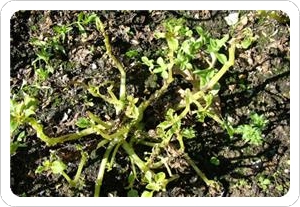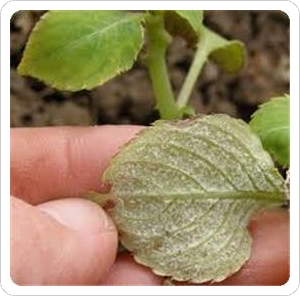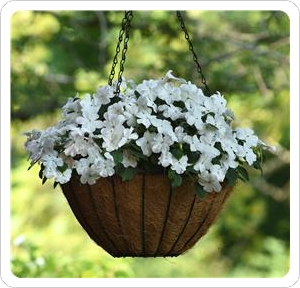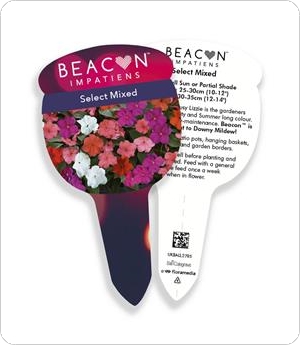Impatiens Downy Mildew
Growers
Impatiens Downy Mildew
Impatiens Beacon® provides high resistance to IDM
History behind the development
In the past 50 years, plant breeding and research has taken Bedding Plants to new exciting places, providing us with better garden performance, greater colour choice and totally new plant forms. But perhaps never before has breeding development brought such a significant plant introduction to our home gardens as the introduction of Impatiens Beacon®.
From 2003 the UK’s number one and most trusted bedding plant, the Busy Lizzie began suffering from outbreaks of Impatiens Downy Mildew (Plasmopara obducens). This followed with outbreaks in 2007/8 and finally brought it to its knees in 2011. The UK Impatiens market estimated to be in excess of £40m contracted by 80% leaving the bedding plant industry and home gardeners with a huge loss of this great garden favourite.
 |
 |
| Typical symptoms of Impatiens Downy Mildew |
|
Since, many great plant varieties have blossomed such as Begonia, New Guinea Impatiens, Dahlia and Petunia. But ultimately, the industry awaited the ‘holy grail’ in plant breeding for the good old Busy Lizzie with resistance to the devastating downy mildew disease.
Hope
An intense breeding programme pursued for many years. However recently, there was hope in the form of ‘Genome Sequencing’.
A collaboration between Ball Colegrave’ sister breeding company PanAmerican Seeds and research company KeyGene, used genome sequencing and assembly as a tool to help the breeding team better target traits they were looking for to incorporate in their breeding programs that already exist but that would take a long time to find. With a sequenced and assembled genome it was easier to find the trait and include it much faster and more efficiently. In this case, identify those plants which had genes with high resistance to IDM.

Impatiens Beacon® breeders - Marika and Ruud
Confused? Think of the genome as a library and the assembled sequence as the card catalogue that tells you where to find the books. The books are not being edited (genome editing) nor are we bringing books from another library in another language into our library (GMO). It is simply learning where to find the book you are looking for. You still have to walk to the shelf and get it. The difference is that you know where to go rather than aimlessly wandering the aisles looking for it.
Results
Following successive years of intense breeding and garden trials, Beacon® Impatiens finally was born, shining a light on the future of bedding plants in gardens across the UK.
Its high resistance* to the currently known and widely prevalent populations of Plasmopara obduscens, which causes Impatiens downy mildew, offers season-long performance and brings back fast-filling colour to the garden ... without the disease risk!
*High Resistance is the technical designation approved by the International Seed Federation (ISF)
What does High Resistance look like?:
|
|
 |
Beacon Coral (left) outperforms a susceptible competing variety (Right) in a side-by-side field trial |

Beacon’s plant habit, flowering time and flower size is similar to previous Impatiens walleriana types. Its mounded and upright shape is perfect for garden borders, baskets, window boxes and patio containers.
Like other Impatiens, there is no special plant culture needed with Beacon® and it will flourish in many soil types and garden positions, from part shade to full sun.
Garden height: 25 – 30cm (10 - 12”)
Spread: 30 – 36cm (12 - 14”)
Plant spacing: 20 – 25cm (8 - 10”)
Marketing Support
To make sure home gardeners know they are buying the genuine Impatiens Beacon™ variety, we offer large colourful branded labels to support your plant sales. There are also posters available on our website, which are free to download and print off at A3 or A1 size.
 |
 |
Beacon® wins awards on its debut launch
 Impatiens Beacon® made its first ever UK debut at the 2019 National Plant Show, receiving a Gold Award and an award for The Best New Annual Plant Variety. Impatiens Beacon® made its first ever UK debut at the 2019 National Plant Show, receiving a Gold Award and an award for The Best New Annual Plant Variety.
This was followed in July with the 2019 Ball Colegrave Trade Summer Showcase where Beacon® proved a real show stopping display.
Beacon® has since received numerous international awards and accolades worldwide for its outstanding disease resistance and contribution to the garden market, including 2 Medals Of Excellence at Cultivate ’19 in Columbus, Ohio.
In January this year, Beacon® brought the red carpet to life at the 62nd Annual GRAMMY Awards®, selected as the floral display by Tu Bloom Designs®, the official botanical artist for this famous Los Angeles event.
Beacon® giving back... Your Purchase Makes a Difference!
In the spirit of bringing light – and happiness – back to gardens all over the world, a donation of a portion of Beacon® Impatiens global sales will be made to by the breeder to a charity every year. Nothing too unusual in that. But in the spirit of Impatiens Downy Mildew (IDM), a serious but little-known plant disease, a little-known but significant charity is to be the benefactor each year. For the 2020 garden season, the donation will go to ‘The OI Foundation’. This is a less-widely known charitable organisation which sets out to improve the quality of life for those living with osteogenesis imperfecta (OI), a genetic bone disorder characterised by fragile bones that break easily, also known as brittle bone disease.
Availability
Beacon® is available as plug and seeds in the following colours: Bright Red, Coral, Orange, Salmon, Violet Shades, White and Select Mixed.
IDM Control with other varieties of Impatiens wallerana
Our recommendation would always be to grow Impatiens Beacon® as this variety has been developed to provide the highest resistance to IDM.
However, should you choose our other wallerana varieties for your seed-raised plug plants, these will have been treated with the pre-emergence fungicide ProPlant and a pre-despatch fungicide Revus, to give your plants the best possible start and protection from the disease.
As always the product will be quality checked before despatch to ensure that symptoms of the disease are not visible.
You are strongly recommended to continue protective measures during your plant production. There can be no guarantee that plants will remain disease free after planting out.
Top tips to minimise problems with IDM during your own production:
• Starting with clean, disinfected hygienic glasshouse growing conditions for each batch.
• Inspecting all your Impatiens plants on arrival and regularly as they grow. Leaf yellowing, mottling and stunting are possible early signs of infection. White spores develop underneath the leaves as the infection progresses.
• Removing, bagging and destroying symptomatic plants from the growing area.
• Maintaining good nutrition, warm temperatures and low humidity in the growing area.
• Planning to include disease prevention measures. For up to date advice ask your fungicide supplier or be visit the ADAS and AHDB websites for the latest recommendations.
Ball Colegrave January 2020
|